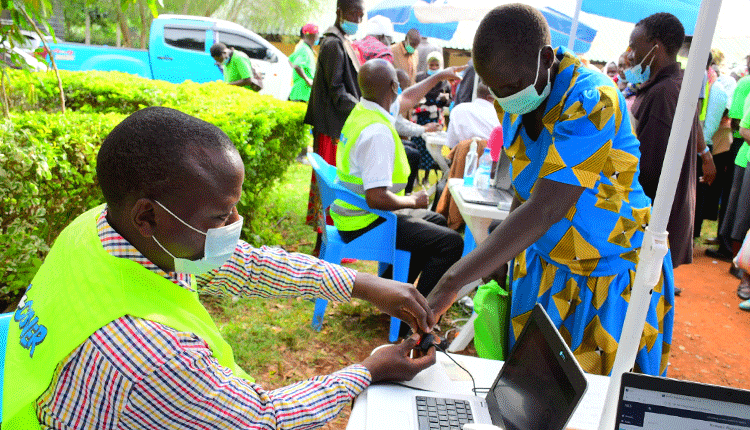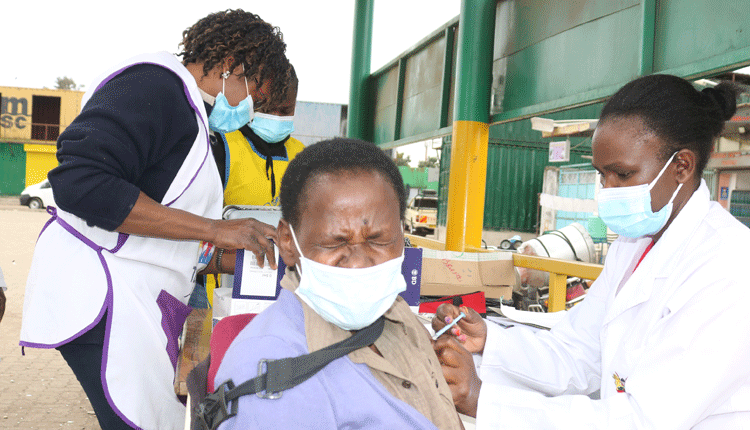Anxiety as country records single highest daily figure

Reuben Mwambingu @reubenmwambingu
The country yesterday reported 123 Covid-19 infections, an alarming new high, even as Health CS Mutahi Kagwe warned that the disease was spreading rapidly in informal settlements in Nairobi.
He singled out Mathare and Kibra— Nairobi’s largest informal settlements— which had recorded 33 and 14 cases in the last 24 hours as the total number of infections shot to 1,471 in the country.
In his usual no-nonsense tone, Kagwe said not a single individual is safe and stressed in Kiswahili: Ugonjwa uko mtaani (the disease is at community level). He said the rise in community infections is simply as a result of an increase in community contact.
“This means that the virus is with us now and no one including you and me is safe. Be it Mama Mboga or a wealthy person, and therefore, no one should have a false sense of security about their immunity to Covid-19,” warned Kagwe.
He added: “The figures which we have shared illustrate the rapid rate of transmission in the informal settlements in Nairobi.
This means that there is a raging number of infections in these areas. We live in these places, have a relative that resides in there or know someone else that does,” he said.
As the deadly respiratory flu whose fatalities reached 55 after the deaths of three patients yesterday, entered a worrying stagewith concerns on the increase in the informal settlements that could see a spike in infection numbers— and even fatalities.
Protocols
In slums, social distancing, self-quarantining, sanitising and handwashing, which are some of the measures and protocols rolled out by the government to stem the spread of coronavirus, are impossible luxuries because of high population and crowding, poverty, poor hygiene and diet.
The situation could be compounded by a stretched public health system that has over the years failed to contain outbreaks such as those of cholera.
Kagwe warned Kenyans against losing focus on the need for exercising vigilance against the virus.
The 123 new cases reported yesterday were from a total of 3,077 samples tested.
A total of 67,341 samples have been tested since the first case was reported in the country on March 13.
Kagwe said this is the first time the country has hit triple figures since the first case was reported.
Out of the new cases Nairobi was leading with 85 cases, followed by Mombasa with 24 while Kiambu had four cases.
Kajiado had three cases and Kisumu two cases while other counties including Garissa, Kitui, Kilifi, Busia and Uasin Gishu recorded a single case each.
Apart from Mathare and Kibra, other area in Nairobi, which reported positive cases, were; Embakasi Central and Westlands four cases each, followed by Makadara, Ruaraka and Kamukunji, which had three cases each.
Starehe and Dagoretti North had two cases each while Roysambu, Langata, Embakasi North and Embakasi South had a case each.
In Mombasa, Mvita was leading with nine cases, followed by Changamwe which has been marked as new hotspot with four, Kisauni four, Jomvu and Likoni three each and one in Nyali.
Kagwe further announced that three more patients succumbed to the virus.
“These three deaths all had underlying conditions. One had diabetes, the second had diabetes and hypertension and the last one had cancer of the breast,” explained Kagwe.
The CS warned that if numbers in Eastlands are rising, it means the same is occurring elsewhere and therefore appealed to Kenyans to volunteer to get tested to know their status.
“Knowing your status is important not only for yourself, but importantly for the protection of others,” he said.
While reminding Kenyans of the need to tirelessly observe health precautions of maintaining social distance, wearing masks and avoiding crowded places, Kagwe called on the public transportation operators to be extra vigilant.
“As you can see some of the highest infections come from areas where public transport is the primary means of transportation…we have noticed that many have reverted to the old ways of travel, disregarding the social distancing rules and not obeying the masking guidelines.
“Please, it is important to protect yourself. Even if you visit a person keep distance and wear mask,” the CS noted.
“We must not always keep on relying on police to remind us of our own safety. We are 47 million people and each of us cannot be assigned a police officer to monitor us.”
With the total number of samples tested now at 67,341, Kagwe said the government would continue increasing the testing capacity depending on availability of reagents and the global supply and demand of the reagents.
“As you can see, we have been increasing the capacity. We started with 500 and now we are at over 3000 samples per day,” the CS said.















